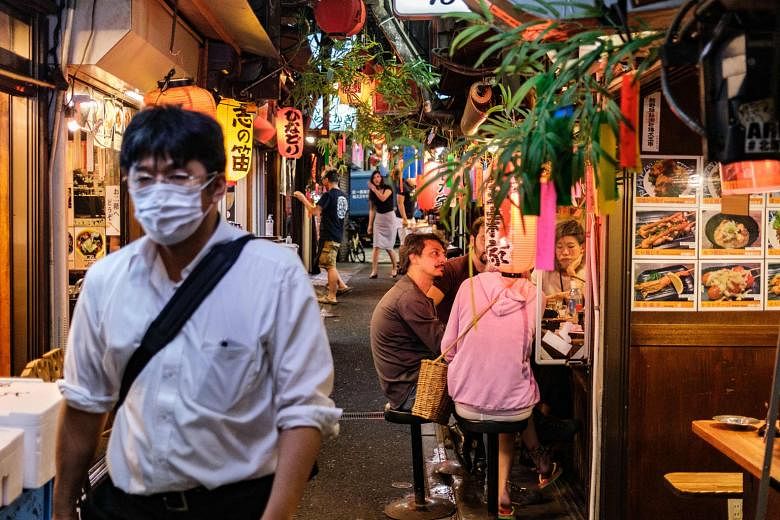Tokyo recorded 48 new Covid-19 cases yesterday, exactly one month after Japan lifted a national state of emergency and one week since the full easing of domestic travel curbs and business closure requests.
Forty per cent of the new cases have unknown routes of transmission. A majority are in their 20s and 30s and either work at or have visited nightlife establishments.
The 48 cases bring the two-day total of new cases in the bustling Japanese capital of 14 million people to 103, the highest number in the last 1½ months.
Among the new areas of transmission were an office cluster, with 16 people in the same workplace becoming infected, and the vibrant nightlife district of Shinjuku.
Mr Tomochika Uyama, director-general of the Office for Covid-19 Preparedness and Response, said this was not unexpected.
Responding to a question by The Straits Times during a news briefing, he said: "The virus is still in town, and as long as the virus is here, there will always be a risk of cases and infections. This will not diminish for the time being."
He added: "Our lives need to be reopened step by step, and this includes domestic travel. So theoretically, of course there is a risk of the virus spreading, but it is more important that people are aware of their behaviour and take necessary steps (to prevent further spread)."
Mr Uyama attributed the rising numbers of cases to more intensive "retrospective tracing methods" to find clusters, as well as an increase in testing capacity leading to more people being screened.
Since the emergency declaration was lifted on May 25, Japan has recorded 1,528 cases, and 17 prefectures have not recorded any new infections.
But urban areas have continued to report many new cases, with Tokyo accounting for 748 infections, or nearly half of the past month's cases.
Fukuoka, where the industrial city of Kitakyushu was hit with a wave of infections, including at schools, has recorded 176 cases since the lifting of the emergency.
Hokkaido, where the city of Otaru is now grappling with a wave of infections from a karaoke outlet, has recorded 156 cases.
The Tokyo metropolitan government has said it would look at reissuing business closure requests if the situation worsens, though The Straits Times understands that this is not yet on the horizon.
Still, the rising numbers of new infections are likely to be a focal issue as Tokyo votes in a gubernatorial election on July 5. Incumbent Governor Yuriko Koike is facing off against 21 competitors for another four-year term.
Protective measures against the spread of the coronavirus include urging voters to use their own stationery, while municipalities have rolled out online features to alert voters about the congestion status at polling stations.











